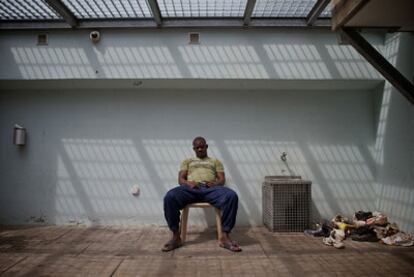"I was a child illegal immigrant"
Swiss-Spanish director Fernand Melgar tackles the subject of forced deportations
They number by their tens of thousands in Switzerland. Commonly known as "secondos," they are the children of the immigrants who arrived here in the 1960s and 1970s from Italy, Spain and Portugal. Born into a family of Andalusian anarcho-syndicalists exiled after the Civil War, Fernand Melgar still remembers being an illegal immigrant as a child in the 1960s, running to hide under the bed every time somebody knocked at the door.
Now the immigrant boy is a prestigious documentary director and is presenting his new film Vol spécial (or, Special flight) in competition at the Locarno Film Festival, running this week in the Swiss city. The movie is a stark look at another form of immigration, more up-to-date and coming from other parts of the world, but perhaps not so different. Melgar takes his camera into the detention center in Frambois, where illegal immigrants arrive to spend two years waiting to be deported back to their countries of origin, places in sub-Saharan Africa or Kosovo.
These deportations became news in Switzerland following the death of a Nigerian man, who suffered a heart attack on the runway of Zurich airport. After that, the world knew that forced repatriations were done with the immigrants' hands and feet tied and their mouths often gagged.
Vol spécial seems to continue the work Melgar undertook in his previous film La Forteresse, which won the Golden Leopard prize at Locarno in 2008. That film portrayed the world of inmates at a center for asylum seekers. "It is not a second part, but to my regret it seems to be one," explains the filmmaker over a beer in Locarno's Teatro Paravento. "The idea for the film was born out of meetings with school-age students. I realized that to them asylum seekers equated to criminals, and asylum law to an abuse of the social system. Having this reality confirmed was very disturbing for me, coming from where I come from.
"What struck me was that some of these people bound for forced deportation have spent 10 or 20 years here. They contribute, they don't depend on state aid and they pay taxes. Their only 'crime' is lacking a piece of paper. And I know about the subject because I was an illegal immigrant as a child."
No utopian, Melgar admits "there are no easy ways out of the problem," at the same time pointing out the laws are in force because "they were democratically voted for by the majority of Swiss citizens."
Despite his criticism, however, this son of anarcho-syndicalist temporary workers is happy in his adopted home. "I am proud of Switzerland," he says. "Its constitution and its core values work for me and I uphold them."

Tu suscripción se está usando en otro dispositivo
¿Quieres añadir otro usuario a tu suscripción?
Si continúas leyendo en este dispositivo, no se podrá leer en el otro.
FlechaTu suscripción se está usando en otro dispositivo y solo puedes acceder a EL PAÍS desde un dispositivo a la vez.
Si quieres compartir tu cuenta, cambia tu suscripción a la modalidad Premium, así podrás añadir otro usuario. Cada uno accederá con su propia cuenta de email, lo que os permitirá personalizar vuestra experiencia en EL PAÍS.
¿Tienes una suscripción de empresa? Accede aquí para contratar más cuentas.
En el caso de no saber quién está usando tu cuenta, te recomendamos cambiar tu contraseña aquí.
Si decides continuar compartiendo tu cuenta, este mensaje se mostrará en tu dispositivo y en el de la otra persona que está usando tu cuenta de forma indefinida, afectando a tu experiencia de lectura. Puedes consultar aquí los términos y condiciones de la suscripción digital.








































